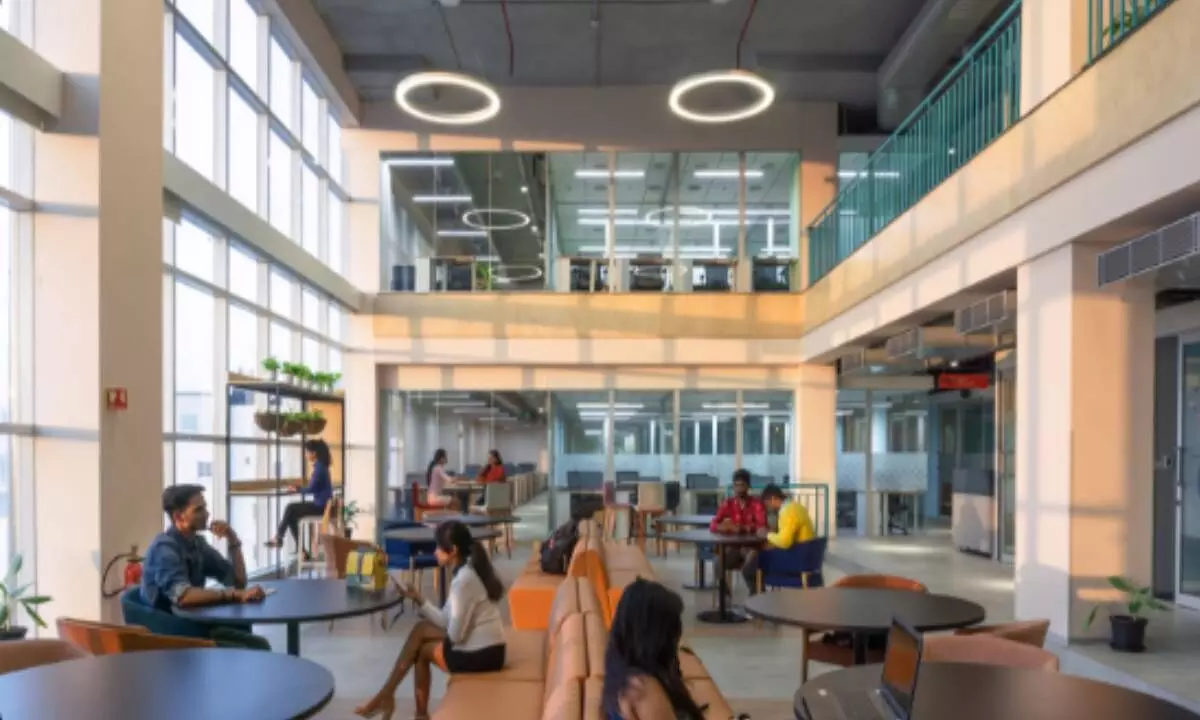8.8 million sft flexible work space leased in 18 mths
From January 2021 to June 2022, over 63% of the total flex space leased precedes 14 million sft in two years of 2019 & 2020, JLL-CoWrks report says
image for illustrative purpose

Mumbai The total flexible space leased by flex operators in the 18-month period from January 2021 to June 2022 stood at 8.8 million sft, which is over 63 per cent of the total space leased in the preceding two years, 2019 and 2020 (14 million sft). During the same period, the share of managed and hybrid operators in flex leasing also increased from 79 per cent to 87 per cent, according to a JLL - CoWrks report titled, 'The age of flex: Creating future-ready workplaces.'
The first half of 2022 saw the flex segment receiving prominence in the occupier space strategies. As such, the share of flex in leasing activity rose to 20.4 per cent, the highest to date. In fact, flex leased 2.8 million sft in Q2 2022, the highest in three years. The H1 2022 numbers are 30 per cent higher than the annual flex space take-up for both 2020 and 2021 individually.
"Domestic firms have seen a faster adoption of flex space with their share rising from 35 per cent in 2019 to 46 per cent during the first half of 2022. Since work from home is being gradually moderated, many employees may still prefer working closer to home, or staying back in their hometowns to continue working there, and thus flex spaces become the best solution," Dr Samantak Das, head of Research and REIS, JLL India said.
In H1 2022, startups were active with a 42.4 per cent share of seats leased among domestic firms. Bengaluru was again the leader followed by Delhi NCR and Hyderabad in startup activity in flex spaces. There is a clear shift in occupier preferences, with the share of non-tech firms rising significantly in the flex ecosystem from 33 per cent in 2019 to 43 per cent in 2021. It stands at 40 per cent in H1 2022, Das further said.
The total flex stock across the top seven cities - Bengaluru, Delhi NCR, Mumbai, Pune, Chennai,
Hyderabad and Kolkata stood at 43.36 million sft at the end of H1 2022. This represents a growth of 690 per cent over the past six years from 6.3 million sft in 2016.
In seat terms, these seven cities have around 679,760 operational seats with as high as 82 per cent of them located in New Business Districts - office corridors that have emerged over the past two decades and now account for the bulk of occupier activity. The rest of the seats are in the Central Business Districts (CBDs) with peripheral markets having a limited presence.
The total flex seats leased in H1 2022 stood at 65,171, which is 75 per cent of the total seats leased in 2021. Of these, the four cities of Bengaluru, Hyderabad, Delhi NCR, and Pune together make up approximately 73 per cent of enterprise activity in the flex market.
In the current scenario, the most dominant offering is a per-seat cost of up to Rs 10,000 per month. Growth, however, lies in the price segments of Rs 10,000 to 20,000 per seat per month range. Over the last six years, the growth rate of flex seats in the range of Rs 12,000 to 18,000 per seat per month crossed 9x,
which is nearly at par with the growth rate of the seats in the lower price range (10x).
Going ahead, managed office services will continue to drive the flex segment growth. However, the enterprise bespoke solution will enable a flex operator to curate the entire space search, design, and services continuum for occupiers. This is already emerging as a specialized service that will create a differentiating factor among operators.
As occupiers look at flexible lease tenures but demand a greater degree of customisation for their workspaces and hospitality-like service levels, pure-play space offerings will no longer be sufficient. It is seen that large flex space players are dominant across all cities in driving the growth of flex leasing in India.

